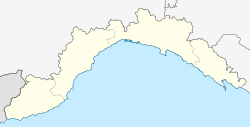Ceriana
Ceriana | |
|---|---|
| Comune di Ceriana | |
 Ceriana | |
| Coordinates: 43°53′N 7°46′E / 43.883°N 7.767°E | |
| Country | Italy |
| Region | Liguria |
| Province | Province of Imperia (IM) |
| Government | |
| • Mayor | Maurizio Caviglia |
| Area | |
| • Total | 32.1 km2 (12.4 sq mi) |
| Elevation | 369 m (1,211 ft) |
| Population (2018)[2] | |
| • Total | 1,214 |
| • Density | 38/km2 (98/sq mi) |
| Demonym | Cerianaschi |
| Time zone | UTC+1 (CET) |
| • Summer (DST) | UTC+2 (CEST) |
| Postal code | 18034 |
| Dialing code | 0 |
| Website | Official website |
Ceriana (locally Çeriana, Genoese: Çeriann-a) is a comune (municipality) in the Province of Imperia in the Italian region Liguria, located about 110 kilometres (68 mi) southwest of Genoa and about 20 kilometres (12 mi) west of Imperia. As of 2018, it had a population of 1,214 and an area of 32.1 square kilometres (12.4 sq mi).[3]
Ceriana borders the following municipalities: Badalucco, Bajardo, Sanremo, and Taggia.
History
[edit]
Built on the site of a Roman fort, Castrum Colianum (from whence the name Ceriana derives), the city took its present shape mostly in the 11th and 12th centuries C.E.[1] Gian Battista Embriaco (1829–1903), professor at the Roman College of Saint Thomas and the inventor in 1867 of the hydrochronometer,[4] was born in Ceriana. Examples of his hydrochronometer can be found in Rome on the gardens of the Pincian Hill and in the Villa Borghese gardens.[5] Embriaco had presented two prototypes of his invention at the Paris Universal Exposition in 1867 where it won prizes and great acclaim.[6]
Culture
[edit]Celebrities
[edit]Giulio Natta, nobel prize for chemistry in 1963, lived in Ceriana, on via della visitazione. Today, there is a plaque in his memory next to his house.
Festivals
[edit]Despite its small population, Ceriana hosts celebrations and events on its main square on most weekends throughout the year, drawing tourists from nearby Sanremo, Nice and beyond. Annual festivals include:[7]
- San Zane Festival, La Festa di San Zane (San Giovanni)
- International Music Festival of the Earth, Festival Convegno Internazionale Musiche della Terra
- Ceriana Sausage Festival, La Sagra della Soucisa a Serianasca
- The Madonna of the Villa, La Madonna della Villa
- Chestnut Festival, Festa della Castagna also called Festa de Rustìe in local dialect, cerianasco
Music
[edit]La Banda Musicale di Ceriana (The Music Band of Ceriana) was originally formed in 1882. Its current iteration was reformed in 1950.[8][9]
Easter Procession
[edit]Several events are held during the Holy Week, La Settimana Santa, around the Catholic Easter, culminating in a series of processions in which four choirs consisting of local men sing ancient Latin chants through the streets of Ceriana and in the main church.
Demographics
[edit]
Twin towns – sister cities
[edit] Guisa, Cuba
Guisa, Cuba
References
[edit]- ^ "Superficie di Comuni Province e Regioni italiane al 9 ottobre 2011". Italian National Institute of Statistics. Retrieved 16 March 2019.
- ^ "Popolazione Residente al 1° Gennaio 2018". Italian National Institute of Statistics. Retrieved 16 March 2019.
- ^ All demographics and other statistics: Italian statistical institute Istat.
- ^ "Orologi". Archived from the original on 2014-12-05. Retrieved 2013-03-20. Accessed 20 March 2013: "È infatti del 1867 l'invenzione dell'idrocronometro, dovuta al padre domenicano Giovanni Battista Embriaco, che attese ai suoi studi di meccanica applicata all'orologeria nella solitudine del convento della Minerva."
- ^ Memorie dei più insigni pittori, scultori e architetti domenicani, Vol. 2 By V. Fortunato Marchese,513, https://books.google.com/books?id=ff9AAAAAYAAJ&pg=PA513 Accessed 20 March 2013
- ^ it:Idrocronometro Accessed 20 March 2013; "Storia del Progetto" https://docs.google.com/viewer?a=v&q=cache:Bug7LKOP08YJ:https://www.comune.roma.it/PCR/resources/cms/documents/storia-idrocronometro.pdf+idrocronometro+%22storia+del+progetto%22&hl=en&gl=us&pid=bl&srcid=ADGEESiGp8xz15iBCs0S33njoGp3ahPhWhYboWzWGkSevHXbmopZpVjeB2eeLuARhkOU9xVdGNOrRBDcpo6ZpFLZ7y_EBpxiRVc5gL1pc4NOloVKHcCyAiFEo2ZnRZtTWxchmaZPm8u5&sig=AHIEtbSmcoAIHFoLacFIXx-vRZzoi9hdJQ Accessed 20 March. 2013
- ^ "Le Feste e le tradizioni". www.comune.ceriana.im.it (in Italian). Comune di Ceriana. Retrieved 2018-11-03.
- ^ "Banda Musicale di Ceriana - Ceriana (IM)". www.bandamusicale.it. Retrieved 2018-11-03.
- ^ "Musica e Teatro". www.comune.ceriana.im.it (in Italian). Comune di Ceriana. Retrieved 2018-11-03.
- ^ "Scheda del comune". comune.ceriana.im.it (in Italian). Ceriana. Retrieved 2021-01-28.



